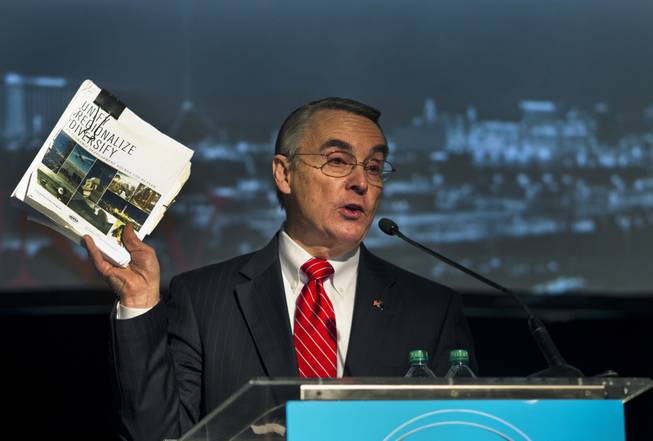
UNLV acting President Don Snyder refers to a Brookings Institution and SRI International economic development agenda for Nevada at the Four Seasons Hotel on Wednesday, March 19, 2014.
Sunday, Aug. 24, 2014 | 2 a.m.
Don Snyder’s title is acting president of UNLV, but his plans for the new school year are anything but temporary.
Snyder, a former Harrah Hotel College dean, took over after former president Neal Smatresk left last winter for North Texas University.
As Snyder enters what he considers a “foundational year,” he is overseeing two projects that could change the face of the university — creating a medical school and building a 50,000-seat multipurpose stadium. He’s also pressing ahead on a plan known as the Path to Tier 1, which would elevate UNLV’s status as a research and academic institution.
Establishing the medical school would require UNLV to obtain $26.7 million in state funding over two years to hire staff and buy equipment for the school. In addition, the university would raise $100 million in private donations to pay for construction of the building.
The stadium would require an additional injection of funding. A recent plan called for a countywide sales tax increase to provide $83 million to pay for the venue’s construction.
The Path to Tier 1 is built around a circular flow chart that starts with establishing a vision and mission to guide decisions on matters from personnel to academics to capital projects. Snyder used a similar strategy to help launch Bank of Nevada and the Fremont Street Experience.
If all goes according to plan, he hopes UNLV’s next president can build on the steps taken this year.
You and the university are tackling a lot of projects this year. Why take on the Path to Tier 1 as well?
To a certain extent, you could say if you’re recruiting a new president, why not wait for the new president to do his own planning process? This is a bit different, because this is about making sure we’re ready to move forward in the best way. There are some fundamental things we need to do to strengthen the foundation on which we’re built. I think this process will do that.
During the last stadium board meeting, committee members discussed imposing a tax on the public and Strip corridor. How likely is it that the Legislature will approve that?
I think the work that’s been done will clearly establish that there is a need for a stadium in Las Vegas. It meets the needs of the university but also provides a unique connection to the resort industry. It is difficult to say what is the best approach to fund it. There are too many unanswered questions with regard to what’s likely to happen with other taxes. Until that gets sorted out in November with the election, there’s too much uncertainty.
Publicly funded stadiums often don’t generate as much revenue as their projections indicate. Is that a consideration with this project?
Economic impact is more of an art than a science. As a banker, I looked at a lot of feasibility studies and economic impact reports, and I’ve come away from that experience realizing that most of them are overstated in terms of what’s projected versus what the reality ends up being. We’ve taken that philosophy at every step of the process. If we’re going to put numbers out there (one study indicated the stadium would generate between $231 million and $511 million in annual spending), I want to demonstrate after the fact that we’re going to achieve those numbers.
Once again, UNLV’s six-year graduation rate ranked below the national average. How will you address that?
That’s one of the reasons the core strategies have to be focused on students, and one of the key metrics will be on graduation rates. What’s not acceptable is 43 percent graduation.
The other major project is the medical school. Where does that stand in the planning process, and how confident are you that you can get it into the governor’s budget in 2015?
The ability for a public medical school to meet the needs of a community is very important, very tangible and should be the foundation on which it moves forward. Then it becomes a matter of can you afford to invest in it? It’s clear to me in states across the country that medical schools properly done in the proper place create a real economic energy. Just as with any business, you have to absorb the startup cost to get to the benefit. We need to commit to the fact that if we get state support, we’ll get philanthropic support to build the facilities that are necessary.
What other priorities do you have for the university this year?
If we were doing nothing but the Path to Tier 1 and running the university, it would be a big deal. Then the medical school and the stadium. Those are three very significant things. In the category of normal, we do have ongoing capital projects. There has been talk for probably 15 years about a new academic building for the hotel college. We got support out of the last legislative session for doing the planning on that, which will allow us to do the fundraising. It’s the No. 1 capital priority for the Nevada System of Higher Education.

Join the Discussion:
Check this out for a full explanation of our conversion to the LiveFyre commenting system and instructions on how to sign up for an account.
Full comments policy